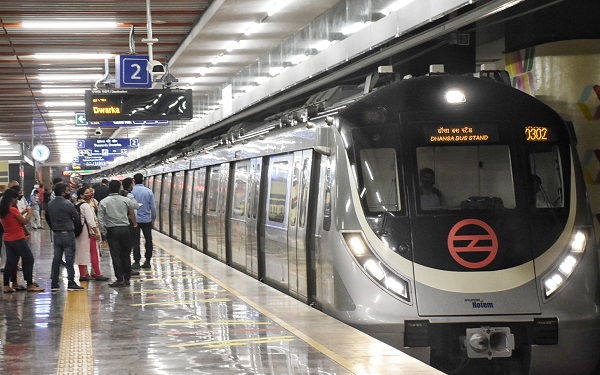New Delhi, (Samajweekly) The Delhi High Court has directed the Delhi Metro Rail Corporation (DMRC) to bring on record its money in various bank accounts to examine how an arbitral award won by Delhi Airport Metro Express Private Ltd (DAMEPL), a Reliance Infrastructure subsidiary, can be enforced.
As per the Supreme Court order, the state-owned enterprise has to pay an arbitral award of around Rs 7,200 crore to the DAMEPL. The DMRC has objected to the rigid stand taken by the private firm regarding the compensation, against the backdrop of the state-owned enterprise facing funds scarcity.
On September 9, Reliance Infrastructure Ltd won a four-year-long drawn battle for control of money from the arbitration award. The Supreme Court dismissed a plea by the DMRC challenging an arbitration award in favour of Reliance Group, following a dispute on running of Delhi Airport Express Metro line. In another jolt to the DMRC, on November 23, the top court junked its review petition against the September order.
Against the backdrop of this legal victory, which affirmed the right to demand compensation, it is perplexing how this demand can be stone-walled any further. Has the DAMEPL short-circuited the process and picked up on loopholes, embedded in the legal course, the answer is: no. The highest court in the country, after a close scrutiny, decided in the DAMEPL’s favour. Then, how is this a wrongful demand?
The delay by a state-owned enterprise, to escape compliance with the Supreme Court order, would be contrary to the government’s large claims on ease of doing business. The DMRC has informed the high court it has over Rs 5,800 crore,with Rs 1,642 crore being its earnings and over Rs 2,400 crore and Rs 1,700 crore being its project allocation fund and deposit fund, respectively. This delay will hit both the DAMEPL and the DMRC.
People familiar with development claim every single day’s delay in the payment of arbitration money to Reliance Infrastructure by the DMRC is causing an additional interest burden of around Rs 2 crore per day on the DMRC. Any further delay, in clearing the demand, would add to the crushing pressure – which is not favourable for the metro rail corporation.
Is it tough for the DMRC to raise a loan to compensate the DAMEPL? Can it not utilise a large pool of resources, available with Centre and state government?
The money, which belongs to Reliance, is with the state-owned enterprise and despite having a ruling in its favour, if a private firm were to run from pillar to post, then it actually defeats the purpose of the arbitral award which was ratified by the country’s apex court. How it is possible for a private firm to abandon its rightful claim.
The DMRC, in the high court, submitted that the government could mediate with the banks to not call in their dues from Anil Ambani companies. Can the state spin around the established procedure for debt repayment, to favour a state-owned enterprise?
It is a tough choice for a company to not pursue its money, and rather stare at bankruptcy – which could entail making tough choices. This will be a systematic blunder and raise apprehensions among the private firms, eventually leading to a trust deficit on the state.










